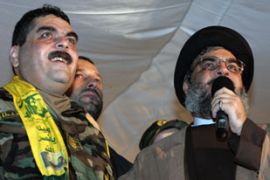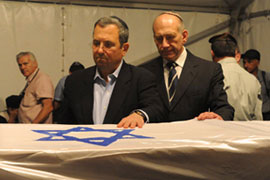Lebanon greets freed prisoners
Lebanese leaders hail “victory” as Israelis mourn over remains of two soldiers returned.

After hugging and kissing each of the former prisoners, Nasrallah addressed the tens of thousands of people in the crowd, many of them waving the yellow and green flag of the movement, hailing the “victory”.
“This people and this nation and this country that gave a clear picture to the world … cannot be defeated,” he said.
Nasrallah’s appearance was the first time he had been seen in public since January.
“He said this is the way to make an achievement, this is the way to free the prisoners,” Al Jazeera’s Rula Amin, reporting from Beirut, said of the televised address Nasrallah gave after leaving the stage.
“He called on all the Arab and Muslim world, he said there are 11,000 Palestinian prisoners still in Israeli jails and this is the responsibility of all the Arab world.”
‘Great resistance’
Kuntar, dressed in military fatigues, also spoke at the rally.
“I would like to thank God the almighty who gave this country this great resistance … I would like to thank God for reaching this day, this day of victories,” he told the roaring crowd.
|
“I promise my people and dear ones in Palestine that I and my dear comrades in the valiant Islamic resistance are returning” Samir Kuntar, |
“I returned today from Palestine but believe me I will not return until I go back to Palestine.
“I promise my people and dear ones in Palestine that I and my dear comrades in the valiant Islamic resistance are returning.”
The prisoners were brought across the border to Naqoura town in southern Lebanon in a convoy of four International Committee of the Red Cross vehicles.
They were met by hundreds of well-wishers before they boarded Lebanese army helicopters for a flight to Beirut, to be received by the country’s president, prime minister and other officials.
“Your return is a new victory and the future with you will only be a shinning march in which we achieve the sovereignty of our land and the freedom of people,” Michel Sleiman, the president, said at the airport.
“I tell Samir and his companions that they have a right to be proud of their country, their army and their resistance.”
Hezbollah named the exchange “Operation Radwan”, in honour of Imad Moughniyah, known as “Hajj Radwan”, the group’s military commander who was assassinated in Syria in February.
Israelis sombre
In contrast to the upbeat mood in Lebanon, the scene across the border in Israel was sombre.
At the family home of reservist Regev, a crowd of about 50 mourners gathered and his family wept, seeing their son’s coffin displayed on television for the first time.
 |
| A short ceremony for the two dead Israeli soldiers was held at a military base [AFP] |
“It was hard to see one coffin being lowered to the ground and then another one. It was awful to see it. I asked them to turn off the television because I didn’t want to see it,” Regev’s father Zvi told public radio.
“We always hoped that Eldad and Udi would return home alive and that we would be able to hug them.”
Before the exchange there had been speculation that at least one of the Israeli soldiers had been alive, but Hezbollah TV confirmed that both were dead.
“The Lebanese people sacrificed almost 800 soldiers, its entire economy,” he said. “For what? For the killer of a three-year-old girl? Is that a hero? For me he is nothing more than a little bigot.”
Ehud Olmert, Israel’s prime minister, Ehud Barak, the defence minister, and General Gabi Ashkenazi, army general, took part in a short ceremony in front of the two soldiers’ coffins at the Shraga military base near Nahariya lte.
The two men’s coffins, draped in the blue and white Israeli flag, were taken to the camp by military escort and placed inside specially erected white tents around which the visitors gathered.
‘Difficult decision’
Miri Eisin, a former aide to Ehud Olmert, the Israeli prime minister, said Israel found the release of Kuntar an “incredibly difficult decision”.
“Today in Israel we are mainly reflecting on the price we pay in our country to defend our borders,” she told Al Jazeera.
David Chater, Al Jazeera’s correspondent in Rosh Hanikra on the Israeli side of the border, said that the Israeli cabinet had “agonised” over the exchange.
“[They] voted in favour of it against the advice of the Israeli intelligence service … which thinks it will only encourage kidnappings,” he said. “But the bulk of Israeli public opinion is behind this deal”.
Almost 200 coffins containing the bodies of Lebanese and Palestinians were also handed back by the Israelis on Wednesday.
Robert Fisk, a Middle East expert and journalist with the Independent newspaper, told Al Jazeera: “It’s regarded as being the final chapter of the 2006 war.”
“The Israelis certainly lost that war, they did not get their prisoners back – not until now and they’re getting them back dead. So more than 1,000 Lebanese civilians and more than 160 Israelis, most of them soldiers, all died for absolutely nothing and that’s what today’s prisoner exchanges prove.”